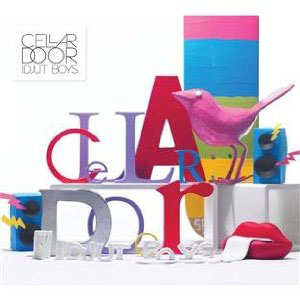Idjut Boys Cellar Door
People like to call out a penchant for Phil Collins when describing the Idjut Boys‘ […]

People like to call out a penchant for Phil Collins when describing the Idjut Boys‘ off-the-wall DJ sets. It should come as no surprise then, that the madly eclectic style and unorthodox musical approach of London selectors Conrad McDonnell and Dan Tyler would manifest itself in their studio work as well. For starters, there’s the fact that despite the pair’s 20-odd years producing together, Cellar Door is its first full-length outing. Then there’s the record’s length. At under 40 minutes, it’s incredibly short by dance-music standards. Finally, there’s its overall vibe, which is, to say the least, mellow. For two dudes who made their name churning out discoid house music—dubby and leftfield, yes, but still basically house—some fans will surely be surprised by Cellar Door‘s dominant laid-back feel.
Where McDonnell and Tyler have stayed most faithful to convention is in their concept of what a traditional LP is, i.e. the vinyl kind, with two sides that can each only hold so much music and maintain high fidelity. “You stick it on your stereo, have a cup of coffee and read the paper. When it’s finished you stick the other side on,” McDonnell is quoted as saying of its length, layout, and, interestingly, the time of day it’s best enjoyed. Even though it’s coming from a dance-music act, Cellar Door doesn’t suffer because of this. It’s over before you expect it to be, but that, in and of itself, isn’t a bad thing. Call it short and sweet. And the vibe is definitely sweet, all acoustic guitars, reverb synths, and Sly & Robbie-worthy bass and drum rhythms. Just as McDonnell points out, it is a daytime record. The only thing missing is the smell of the ocean coming from an island breeze.
Then again, the atmospheric swooshes that flow through the Balearic midtempo of “Shine” are a spot-on personification of rustling palm trees. Recorded with help from Sally Rodgers and Steve Jones of classic chillout act A Man Called Adam, it goes a long way to recreating the storied downtempo sound of a Cafe Del Mar sunset session. The same is true of “The Way I Like It,” which even leads in with seagulls and slide guitar before settling into the record’s most relaxed moment. Rodgers lends her voice again, assuring the track’s designation as beachside stoned groover. It errs dangerously close to generic sushi-restaurant soundtrack, but in the Idjut Boys’ hands, it manages to remain sincere. These guys are the furthest thing from trend chasers—especially when the predominant style is one that peaked more than five years ago. If anything, it returns the listener to a place in time, an era when acid jazz ruled, Gilles Peterson was the epitome of cool, and electronic music was allowed to have a soft side.
Working with session players Bugge Wesseltoft, the well-known Norwegian nujazz pianist, and Malcolm Joseph, one of Grace Jones’ touring musicians, the Idjuts get closest to their trademark sound on lead single “One for Kenny.” With Wesseltoft’s Steinway cascading throughout and Joseph’s bass work lending disco-dub appeal, McDonnell and Tyler do what they do best, working these live bits over and over from the studio and glossing the affair with chicken-scratch guitar, echo-chamber effects, a space-boogie beat, and a THC haze. It’s one fit for DJ Harvey’s crates and as good as almost anything surfacing on Permanent Vacation these days.
On what could be considered the a-side closer, “Going Down,” marries Cellar Door‘s Balearic and space-disco tendencies, combining the strum of an acoustic guitar with a house thump and walking bassline. Another cut with A Man Called Adam’s lead vocalist, this one sounds as if it were given a remix by Todd Terje, someone who surely credits the Idjut Boys as an early influence. “Love Hunter,” the only track on the record to crack 120 bpm, sees the studio rebels at their most playful, channelling those patented DJ sets with prog-rock guitar layers, then brightening them with a disco shimmer. There’s even a touch of country twang, something fans of Lindstrøm’s early productions will smile at.
It’s easy to classify the Idjut Boys’ work in relation to output by the duo’s more prominent contemporaries. Cellar Door could have just as easily surfaced on a label like Eskimo or Feedelity, where McDonnell and Tyler would fit right in alongside those imprints’ principals, but this shouldn’t paint them or their long-overdue debut as derivative. Two of disco’s original upsetters, these two helped pave the way for the genre’s deconstruction. So, in a weird way, there’s some twisted logic to the fact that they’ve showed up late to the party, sporting a sound that is at once antiquated and hip, and oddly enjoyable to listen to.

